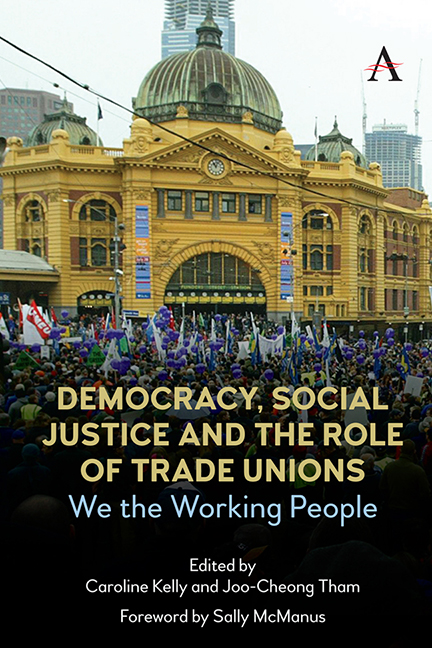Book contents
- Frontmatter
- Contents
- Foreword
- Acknowledgements
- Chapter 1 Democracy and Social Justice as Organising Principles
- Chapter 2 Economic Democracy, Workers and Unions
- Chapter 3 Nobody Owns the Future
- Chapter 4 Regulatory Approaches to the Internal Affairs of Trade Unions in Australia: From Democratic Control to Corporate Accountability
- Chapter 5 Trade Unions and the Regulation of Election Funding: Between Libertarianism and Egalitarianism
- Chapter 6 Trade Unions and Precarious Work: In Search of Effective Strategies
- Chapter 7 ‘Is There an App for That?’ Worker Representation, Unions and the Gig Economy
- Chapter 8 Temporary Migrant Workers and Trade Unions in Australia: A Complex Relationship
- Chapter 9 Unions, Fossil Fuel Exports and a Just Transition
- Chapter 10 Trade Agreements, Labour Rights and Democracy
- Chapter 11 Trade Unions, Labour Law and Democratic Socialism: The COVID-19 Crisis in the United Kingdom
- Notes on Contributors
- Index
Chapter 5 - Trade Unions and the Regulation of Election Funding: Between Libertarianism and Egalitarianism
Published online by Cambridge University Press: 18 November 2021
- Frontmatter
- Contents
- Foreword
- Acknowledgements
- Chapter 1 Democracy and Social Justice as Organising Principles
- Chapter 2 Economic Democracy, Workers and Unions
- Chapter 3 Nobody Owns the Future
- Chapter 4 Regulatory Approaches to the Internal Affairs of Trade Unions in Australia: From Democratic Control to Corporate Accountability
- Chapter 5 Trade Unions and the Regulation of Election Funding: Between Libertarianism and Egalitarianism
- Chapter 6 Trade Unions and Precarious Work: In Search of Effective Strategies
- Chapter 7 ‘Is There an App for That?’ Worker Representation, Unions and the Gig Economy
- Chapter 8 Temporary Migrant Workers and Trade Unions in Australia: A Complex Relationship
- Chapter 9 Unions, Fossil Fuel Exports and a Just Transition
- Chapter 10 Trade Agreements, Labour Rights and Democracy
- Chapter 11 Trade Unions, Labour Law and Democratic Socialism: The COVID-19 Crisis in the United Kingdom
- Notes on Contributors
- Index
Summary
Two overarching goals are central to the role of trade unions in society: social justice and democracy (see Chapter 1 of this volume). Both imply a range of functions and strategies that invariably stamp trade unions as political organisations (should politics be understood as activity aimed at influencing the exercise of power). Trade unions seek to influence the exercise of power at the workplace by providing a countervailing force to employer power. This typically occurs through the institution of collective bargaining and the regulatory function it performs in laying down labour standards – standards critical for workers to receiving a ‘just share of the fruits of progress’. Through the same processes, and more generally, the representative function of trade unions, organisations of working people seek to give workers a voice in the workplace and society at large.
It is not only industrial-political activities that characterise trade unions as political organisations but also their political-political activities (those aimed at influencing the exercise of governmental power). While the nature and extent of trade union involvement in such activities depends on a range of factors, there is no doubt that all trade unions will be involved in some kind of politicalpolitical activity. As Hyman has noted:
Regulating the labour market involves political issues […] The state is not only the ultimate guarantor of contracts, including employment contracts; whether by active intervention or by default, it underwrites a particular (im)balance between different participants in market relations. At a very minimum, unions have to influence the ways in which the state shapes the rules of the game in the labour market, including their own right to exist, to bargain collectively and to mobilize collective action.
That is to say that political-political activity will be significant, whatever the model of trade unionism. It is clearly so with social movement unionism (aimed at socialising the capitalist economy) or radical unionism (directed at an anti-capitalist agenda) but also the case with business unionism (focused on collective bargaining). The importance of political-political activity is similarly recognised by the International Labour Organization (ILO) jurisprudence on the right to strike which does not sharply distinguish such activity from industrial-political activity.
- Type
- Chapter
- Information
- Democracy, Social Justice and the Role of Trade UnionsWe the Working People, pp. 77 - 92Publisher: Anthem PressPrint publication year: 2021



